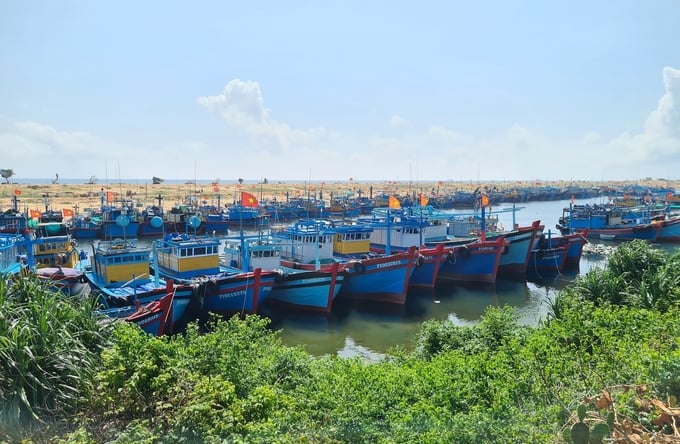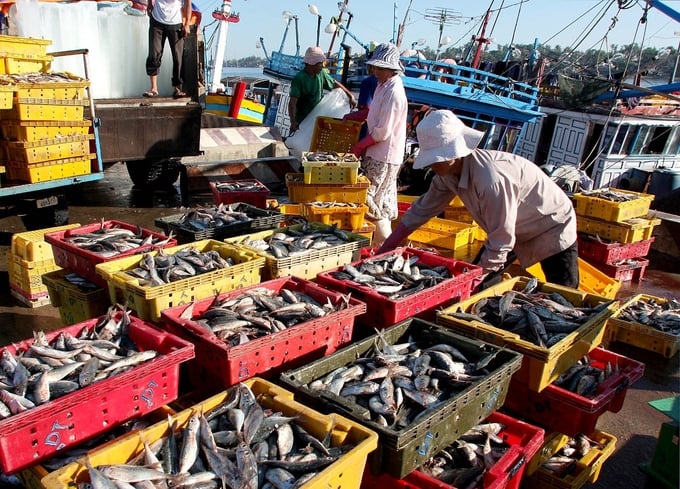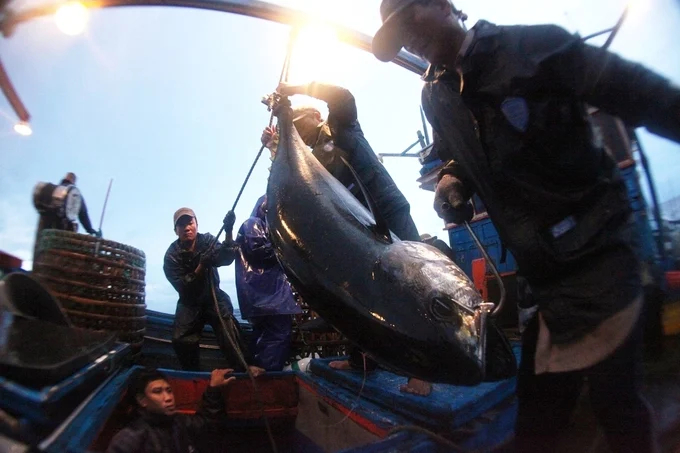May 21, 2025 | 04:11 GMT +7
May 21, 2025 | 04:11 GMT +7
Hotline: 0913.378.918
May 21, 2025 | 04:11 GMT +7
Hotline: 0913.378.918
Despite years of implementing measures to combat illegal, unreported, and unregulated (IUU) seafood exploitation in accordance with the recommendations of the European Commission (EC) and strengthening the management of the country's fisheries activities, Vietnam has increasingly stringent regulations. However, numerous challenges persist and must be urgently addressed before the arrival of the 5th EC Inspection Team.
While efforts have garnered recognition and opportunities remain open, achieving the desired outcome requires extraordinary dedication. Vietnam Agriculture Newspaper conducted an interview with Mr. Nguyen Quang Hung, Director of the Department of Fisheries Surveillance (Ministry of Agriculture and Rural Development), to delve into the opportunities and challenges facing Vietnam in removing the IUU 'yellow card' in the upcoming inspection.

Director Nguyen Quang Hung pointed out that although the origin traceability group is performing well, there are still instances of document legalization discrepancies discovered by the EC during the 4th inspection. Photo: Hong Tham.
Despite the Government, ministries, departments, branches, and localities actively implementing various solutions in line with the EC's recommendations on combating IUU fishing over the past six years, why hasn't the EC agreed to remove the 'yellow card'?
Over the past six years, there has been considerable engagement from the Government, Prime Minister, ministries, branches, and localities. The EC has acknowledged our efforts and determination to make progress in combating IUU fishing. However, based on the EC's four groups of recommendations, it is assessed that Vietnam have not fully met all of their requirements.
Firstly, regarding the legal framework group, Vietnam have made significant progress in reviewing, completing, and currently submitting to the Government for consideration and promulgation a Decree amending and supplementing certain articles of Decree No. 26/2019/ND-CP dated March 8, 2019, of the Government, which details various articles and measures to implement the Fisheries Law. Additionally, Vietnam are proposing a decree to replace Decree No. 42/2019/ND-CP dated May 16, 2019, of the Government, which regulates sanctions for administrative violations in the fisheries sector.
Secondly, the working group responsible for managing and monitoring the fishing fleet has seen proactive efforts from localities in controlling the number of fishing vessels and ensuring adherence to regulations regarding fishing activities to prevent IUU fishing.
Thirdly, the origin traceability team has demonstrated commendable performance; however, there are still instances of document legalization discrepancies identified by the EC during the 4th inspection.
Fourthly, despite increased deployment and activity from law enforcement forces, the ratio of violations to administrative sanctions remains unsatisfactorily low compared to EC recommendations. Furthermore, the EC has noted disparities in law enforcement among localities, with some demonstrating drastic and active measures while others have not fully participated.
Additionally, there are limitations in the handling of administrative violations, with instances of non-compliance persisting due to a lack of enforcement. This situation has led to continued violations of fisheries laws and related regulations by fishing vessels and fishermen.
Despite the progress acknowledged by the EC over the six-year period of IUU 'yellow card' removal efforts, Vietnam has yet to fully meet the four major groups of recommendations outlined by the EC. As a result, the 'yellow card' warning remains in place.
Of the 4 groups of recommendations that the EC provided, which group of recommendations do you believe presents the greatest challenge for us to address?
Among the four groups of EC recommendations, we must essentially address them in a synchronized manner. However, to date, the group of recommendations posing the most significant challenge for us is the control of fishing vessels and the monitoring of fleets while they operate at sea.
We possess an extensive fishing fleet, totaling over 86,000 fishing vessels, with more than 29,000 of them being offshore fishing vessels, ranking second in the number of fishing vessels in the East Sea region. This vast fleet size presents a considerable obstacle in effectively managing and monitoring fleet operations.

Vietnam possess an extensive fishing fleet, totaling over 86,000 fishing vessels. Photo: Hong Tham.
Furthermore, Vietnam boasts numerous estuaries, coastal creeks, and private fishing ports, through which fishing fleets frequently transit, making comprehensive control exceedingly difficult.
Moreover, in terms of resources, local law enforcement officers and fisheries managers are severely understaffed, insufficient to adequately oversee the multitude of fishing boats and coastal estuaries. This stands as the foremost challenge confronting localities at present.
Currently, the Government and Prime Minister have issued directives for provinces to conduct thorough reviews, assessments, and stringent management of fleets.
What impact has the EC's 'yellow card' warning had on our country's fisheries industry, as well as on the lives of fishermen in recent times, sir?
It must be acknowledged that the EC's IUU 'yellow card' warning serves as an opportunity for restructuring the fishing industry. This aligns with our aim and strategy to foster sustainable, responsible fisheries and international integration in the future.
"The EC acknowledges our efforts, determination, and progress in combating IUU fishing. However, based on the EC's four groups of recommendations, it is assessed that we have not fully met all of their requirements," emphasized Director of the Department of Fisheries Surveillance, Nguyen Quang Hung.
Nevertheless, Vietnam's seafood industry experienced significant repercussions during the 'yellow card' warning period, impacting its reputation, image, and standing domestically and internationally. The effects were particularly profound on the seafood export sector, leading to a decline in Vietnam's seafood exports in recent years. For businesses exporting to European markets, the EC subjected 100% of their records to scrutiny, resulting in significant financial losses incurred during storage and transportation.
Moreover, fishermen bore the brunt of the 'yellow card' warning, with a subset of illegal fishermen disrupting the operations of lawful fishermen during exploitation and sales processes.
Deputy Prime Minister Tran Luu Quang affirmed that the 5th inspection is a great opportunity for Vietnam to remove its "yellow card" before the EU election. If we cannot remove it, Vietnam will lose more time. How do you view this opportunity?
The upcoming 5th inspection is a great opportunity and a good opportunity if we are more drastic to overcome the 4 groups of EC recommendations, moving towards removing the "yellow card" warning.
The European side has very high support, and there is also very careful coordination and communication with the Vietnamese side. The EC side is also very willing to help us remove the "yellow card" warning, aiming to develop sustainable fisheries.

To remove the IUU 'yellow card,' the foremost requirement remains the awareness and accountability of individuals directly engaged in sea fishing. Photo: Hong Tham.
Presently, the Government and Prime Minister have provided meticulous guidance on tasks, solutions, and responsibilities for each relevant ministry, department, branch, and locality in addressing and rectifying the deficiencies identified within the four major groups of recommendations. Deputy Prime Minister Tran Luu Quang, as the Head of the National Steering Committee on IUU, has clearly delineated the tasks and solutions.
However, the efficacy of these implementation efforts hinges largely on the resolute, consistent, and sustained engagement of localities, particularly the leadership roles of local officials and fisheries management entities (Department of Fisheries, Sub-Department of Fisheries), as well as fishing port management boards. Active participation from these stakeholders is pivotal in surmounting shortcomings and limitations. With such determination, we anticipate gradual improvement in the forthcoming months.

The opportunity to remove our "yellow card" warning during the 5th inspection remains. Photo: Xuan Truong.
The opportunity to remove our 'yellow card' warning during the 5th inspection persists; however, it necessitates a proactive and committed approach at a level of 200-300%, viewing it almost as a daily imperative.
Translated by Quynh Chi

(VAN) Japan's grant aid project contributes to capacity building, promoting organic agricultural production, and fostering sustainable community development in Dong Thap province.

(VAN) For years, the CRISPR-Cas9 genome technology has been reshaping genetic engineering, a precision tool to transform everything from agriculture to medicine.

(VAN) Vietnam aims to become a 'leader' in the region in the capacity and managing effectively soil health and crop nutrition.
![Reducing emissions from rice fields: [Part 1] Farming clean rice together](https://t.ex-cdn.com/nongnghiepmoitruong.vn/608w/files/news/2025/05/05/z6509661417740_a647202949c539012a959e841c03e1d3-nongnghiep-143611.jpg)
(VAN) Growing clean rice helps reduce environmental pollution while increasing income, allowing farmers to feel secure in production and remain committed to their fields for the long term.
/2025/05/19/5136-1-144800_230.jpg)
(VAN) The Nghe An Provincial People's Committee has just approved the list of beneficiaries eligible for revenue from the Emission Reductions Payment Agreement (ERPA) in the North Central region for the year 2025.

(VAN) 14 out of 35 domesticated elephants in Dak Lak province have had their living conditions improved, with 11 of them currently participating in the non-riding elephant tourism model.

(VAN) Muong Nhe Nature Reserve hopes that being upgraded to a national park will lay the foundation for forest protection efforts to be carried out in a systematic, modern, and sustainable manner.